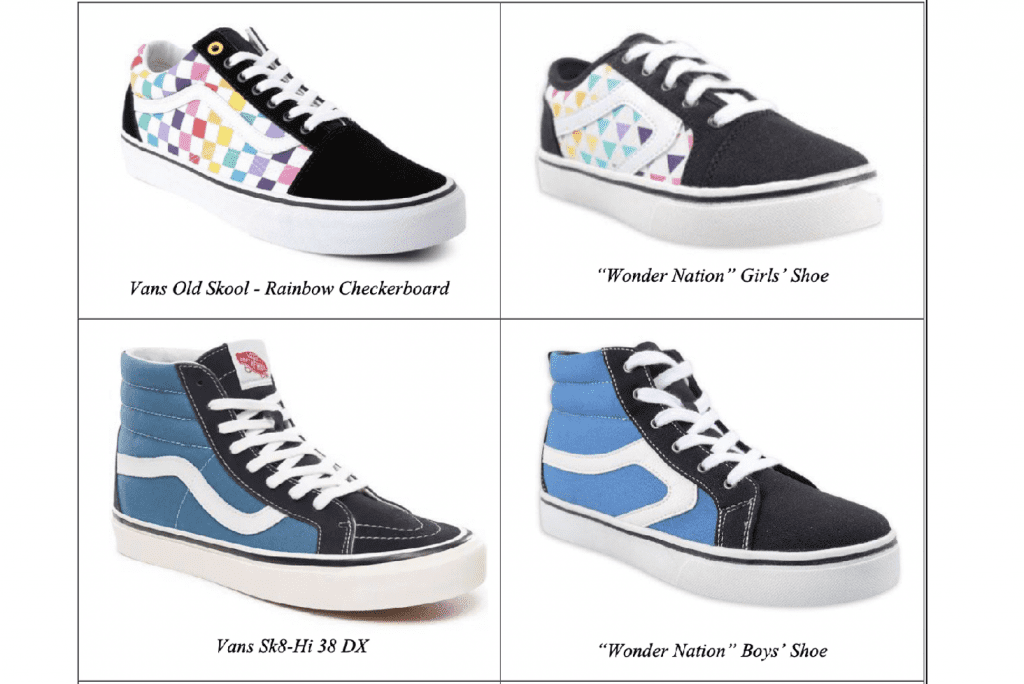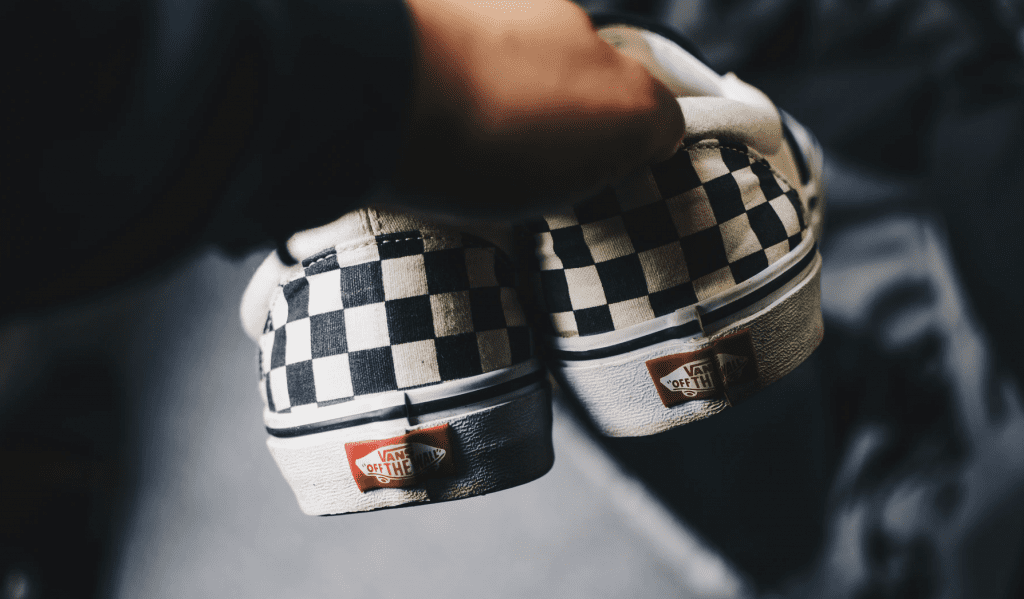A preliminary injunction to block Walmart from continuing to sell “copycat” versions of “virtually all of [its] bestselling shoes” is necessary, Vans and its parent company VF Corp. assert in a recent filing in the lawsuit that they waged against the retail titan in November. On the heels of Walmart pushing back against Vans’ quest to secure an injunction to bar Walmart from further escalating its “infringement campaign” for the duration of the case, Vans argues that Walmart puts forth little more than “a few unsupported arguments,” and in failing to “dispute that it is flooding the market with its knockoff shoes … confirms that a preliminary injunction is necessary.”
Vans and its parent company VF Corp. filed a trademark infringement and unfair competition suit against Walmart in a California federal court late last year, alleging that in a brazen attempt to bank on the multi-decade-long appeal of its brand and famous offerings, Walmart – through its own in-house labels – has “flooded the market with cheap, low-quality, and confusingly similar shoes” that are little more than “blatant knockoff versions of Vans shoes. Because Walmart’s lookalike offerings are “likely to cause confusion, deception, and mistake by creating the false and misleading impression that the defendants’ goods are produced or distributed by Vans, or are affiliated, connected, or associated with Vans, or have the sponsorship, endorsement, or approval of Vans,” Vans claims that Walmart is “willfully infringing [its] trademark and trade dress rights” and is seeking preliminary and permanent injunctive relief.
In a filing last month, in which it urges the court to shot down Vans’ bid for a preliminary injunction, Walmart argued that Vans waited too long to file suit against it, having known about the allegedly infringing footwear for at least 18 months, thereby, rebutting the presumption of irreparable harm (i.e., harm that cannot be compensated by a monetary damages award), which is the most critical element that weighs in favor of injunctive relief. At the same time, Walmart asserted that “the extraordinary remedy of a preliminary injunction” is not warranted here because Vans is not suffering “any irreparable harm,” it is not losing sales and its reputation is not being diminished as a result of Walmart’s footwear.”
Still yet, Walmart argued in response to the lawsuit and bid for an injunction lodged by Vans that the is unlikely to prevail on the merits of its lawsuit, as the trademarks rights that the case rests on, including its Side Stripe Mark, are “weak” and consumers are unlikely to be confused as to the source of the parties’ offerings. (More about that here.)

Vans has since lodged its reply to Walmart’s memo in opposition, taking issue with Walmart’s arguments, including the retailer’s claims that Vans lacks robust trademark rights, primarily for its OLD SKOOL sneaker. Looking specifically to the OLD SKOOL mark, Vans states that “based on longstanding use dating back more than 40 years, substantial sales and advertising, unsolicited media references, popular culture usage, and intentional copying by Walmart, Vans is likely to succeed in demonstrating that the OLD SKOOL trade dress has acquired secondary meaning.” In terms of sales, Vans says that it has generated “$10 billion in lifetime sales and current revenue of over $1 billion each year in U.S. sales of shoes bearing the OLD SKOOL trade dress.”
Turning to Walmart’s request that the court “ignore Vans’ evidence, including evidence of actual confusion in the marketplace, based on hearsay and foundation objections.” Vans claims that Walmart gets the law wrong here, as a court “can consider otherwise inadmissible evidence, including hearsay, in deciding whether to issue a preliminary injunction.” (In its memo, Walmart argued that “materials from the internet, such as social media posts” that reference the “Vans dupes” and “knockoffs” being sold by Walmart, which Vans uses to show actual confusion about the nature of Walmart’s footwear, “lack foundation, are unauthenticated, and constitute hearsay.”)
The parties’ arguments on this front are particularly interesting given the frequency with which brands point to things like comments from consumers on social media platforms and on brands/retailers’ websites, particularly in product review sections, to establish a likelihood of confusion.
Not the only party to call foul when it comes to social media commentary, Nike previously took issue with the 18 pages of social media screenshots that digital music and technology startup Soulection included in the cease-and-desist letter that it sent to the Swoosh back in 2020. According to Nike, examples of social media comments were “neither relevant nor reliable evidence [of] confusion,” as “the proper [standard]” for determining likelihood of confusion, Nike says that is “whether consumers purchasing the NIKE SB Shane Shoe hold the mistaken belief that it is somehow affiliated with or sponsored by Soulection,” and that is not what is established in the majority of the social media comments, such as ones that state that “Clearly this is Soulection’s logo” or that Nike “straight stole [Soulection’s] logo without its consent.”
Among other things, Vans takes issue with Walmart’s claims that consumers will not confuse the parties’ footwear, in part because of the different distribution channels that its shoes and Vans’ shoes occupy. Specifically, Walmart states that its shoes “are only sold at Walmart stores and on Walmart.com,” which is distinct from Vans’ distribution, which consists of “Nordstrom’s, Urban Outfitters, Foot Locker, and Vans’ own retail stores,” and makes it so that “Walmart shoppers know what they are buying, and they are not confused or tricked into believing that they are buying Vans shoes.”
This is too narrow an argument, per Vans, as “Walmart ignores post-sale confusion and focuses solely on point-of-sale confusion among purchasers” of the shoes, which “have no labels visible to post-sale consumers; instead, the only branding post- sale appears inside and on the bottom of the shoe.” (Post-sale confusion focuses not on the potential confusion of a purchasing customer at the point of sale, but refers to the potential for confusion by third-party observers of the product bearing a confusing trademark after the initial point of sale. The risk of harm to a trademark holder in a post-sale capacity has been questioned, including by Kal Raustiala and Chris Sprigman in their 2018 paper, “Rethinking Post-Sale Confusion.”)
Pointing to Ninth Circuit precedent from Karl Storz Endoscopy Am., Inc. v. Surgical Techs, Vans asserts that the law “is clear that post-purchase confusion can establish a likelihood of confusion under the Lanham Act.”
As for Walmart’s argument that Vans did not act promptly enough in taking action over the allegedly infringing footwear, Vans pushes back here, arguing that Walmart “completely ignores that Walmart’s infringing activities escalated,” and noting that the Ninth Circuit “has explained that it is reasonable, not dilatory, to wait to file a preliminary injunction when a defendant’s escalating actions become irreparable over time.” That is precisely what is going on here, according to Vans, which states that “Walmart’s own evidence confirms that Walmart fully intends to flood the market with its infringing shoes – throughout all of its 3,500+ retail stores and online – if [Van’s preliminary injunction] motion is not granted.”
With the foregoing in mind and given that the “balance of hardships strongly favors Vans,” as Walmart is “essentially free rid[ing] off” of the “significant resources” that Vans has invested “in promoting goods bearing its trade dress,” while also “undermining Vans’ goodwill and sales strategy,” Vans argues that its motion for preliminary injunction should be granted.
The case is Vans, Inc. et al, v. Walmart, Inc., et al, 8:21-cv-01876 (C.D.Cal.)














